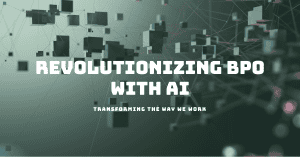The evolution of Business Process Outsourcing (BPO) has been a game-changer in the global business landscape. Initially focused on voice-based customer support, the industry has witnessed a significant shift towards Non-Voice Process BPOs. These non-voice services, encompassing a wide array of backend tasks such as data entry, email handling, and chat support, are now pivotal in modern business operations.
Automation plays a crucial role in Non-Voice Process BPOs, leading to higher efficiency and cost savings. Automated customer service solutions are redefining the way businesses handle customer interactions, making processes faster and more reliable. Additionally, digital transformation in BPOs is not just a trend; it’s a strategic necessity, ensuring businesses stay competitive in a rapidly evolving digital world.
The global outsourcing market has expanded significantly, with Non-Voice Process BPOs becoming an integral part. This growth is driven by the need for cost-efficient BPO solutions and the ability of these services to offer scalability and flexibility to businesses. They are an excellent option for small businesses and large corporations alike, providing access to specialized skills without the need for extensive in-house resources.
One of the primary advantages of Non-Voice Process BPOs is cost efficiency. Businesses can reduce overhead costs by outsourcing non-core tasks to specialized service providers. Scalability is another significant benefit, allowing businesses to adjust the level of service based on their current needs without the commitment of long-term resources.
When choosing a Non-Voice BPO partner, businesses should consider factors like expertise in specific services (e.g., data entry, chat support), proven track record in process improvement, and the ability to provide multi-channel support. It’s also crucial to evaluate their commitment to digital transformation and client management.
Understanding Non-Voice Process BPOs
Non-Voice Process BPOs, a pivotal element in the Business Process Outsourcing (BPO) industry, specialize in tasks that don’t require telephonic interaction. These BPOs handle various backend tasks, enhancing efficiency and allowing businesses to focus on core operations. From data entry and email support to sophisticated IT services, these BPOs are integral in driving the digital transformation of businesses, ensuring scalability, and improving client management processes.
Types of Non-Voice Services Offered
- Data Entry Services: A critical component of back office operations, data entry services include converting paper formats into digital data, updating databases, and ensuring accurate and efficient data management.
- Email Support Services: This involves managing customer queries and communications via email, a vital aspect of customer support solutions in today’s digital world.
- Backend Processing: This encompasses a range of services, including database management, inventory management, and other administrative tasks essential for smooth business operations.
- Chat Support Services: Offering real-time assistance to customers, chat support services are key in providing multi-channel support and enhancing customer satisfaction.
- Automated Customer Service: Leveraging automation and AI, these services streamline customer interactions, improving process efficiency and contributing to cost-efficient BPO solutions.
Non-Voice BPOs: A Catalyst for Business Efficiency
- Cost Efficiency: By outsourcing non-core tasks like data entry or email handling, businesses can significantly reduce operational costs. The cost benefits of non-voice process BPOs extend beyond mere labor cost savings, encompassing overall process improvement and efficiency gains.
- Scalability Solutions: Non-Voice Process BPOs allow businesses to scale their operations without the added burden of hiring and training new staff. Whether it’s during seasonal spikes or business growth phases, these BPOs provide the necessary support.
- Global Outsourcing Market: The rise of non-voice BPOs is a testament to the global outsourcing trend, where businesses seek to leverage international talent pools for cost-effective and efficient business solutions.
- Digital Transformation in BPO: Embracing the latest technologies, non-voice BPOs play a crucial role in the digital transformation journeys of businesses. From automation to advanced data analytics, these BPOs are at the forefront of integrating IT-enabled services into everyday business processes.
Choosing the Right Non-Voice Process BPO
When selecting a non-voice process BPO, consider factors such as their expertise in specific services like data entry or chat support, their track record in process automation, and their ability to offer tailored solutions for SMEs or large corporations alike. Look for BPOs that demonstrate a clear understanding of global outsourcing trends and can offer insights into the non-voice BPO growth trajectory.
Efficient Data Entry Outsourcing Strategies
Implementing efficient strategies for data entry outsourcing involves assessing the data requirements, understanding the complexities of the data to be processed, and ensuring that the BPO has robust data security measures in place. Opting for a BPO that aligns with digital transformation goals and offers IT-enabled services can further enhance data entry efficiency.
Impact on Productivity and Client Relationship Management
Non-voice process BPOs significantly impact productivity by freeing up internal resources, and allowing businesses to focus on core competencies. Furthermore, efficient handling of backend tasks like email support and data entry contributes to stronger client relationship management by ensuring prompt and accurate responses to client needs.
The Advantages of Non-Voice Process BPOs
Non-Voice Process BPOs offer unparalleled cost benefits to businesses. By outsourcing non-core activities like Data Entry and Email Handling, companies save on labor costs while gaining access to specialized skills. This move not only optimizes expenditures but also scales operations without the need for extensive capital investment. In fact, the cost benefits of non-voice process BPOs have been a game-changer for many small and large enterprises alike.
Round-the-Clock Service and International Reach
One of the standout advantages of Non-Voice Process BPOs is their ability to provide continuous service. Outsourcing to global service providers means businesses can offer 24/7 Customer Support and Chat Support, a critical factor in today’s fast-paced market. This international reach not only improves customer satisfaction but also opens doors to global markets, making it an essential strategy in global outsourcing.
Increased Accuracy in Data Handling and Processing
Automation in BPOs, especially in areas like Data Entry Services and Back Office Operations, has significantly improved accuracy and efficiency. These advancements minimize human error, ensuring higher data quality and faster processing times. This precision is crucial for industries where data integrity is paramount.
Innovation Through Digital Transformation
Non-Voice Process BPOs are at the forefront of digital transformation in business. Automated Customer Service Solutions and IT-enabled services not only streamline operations but also pave the way for innovative practices in process improvement and client management. As a result, businesses can stay ahead in the competitive market, constantly adapting to changing consumer needs.
Improving Client Management and Technical Support
Non-Voice BPOs are not just about handling repetitive tasks; they play a significant role in enhancing client relationship management and providing specialized Technical Support. This aspect of business process outsourcing ensures that businesses can focus on core competencies while outsourcing entities handle complex, non-core tasks efficiently.
Enhancing Business Scalability
Business Scalability Solutions is a significant advantage offered by Non-Voice Process BPOs. Companies can easily adjust their operations to market demands without the need for significant resource reallocation. This flexibility is particularly beneficial for SMEs looking to expand their operations without incurring substantial costs.
Integrating Non-Voice Process BPOs into Your Business
In the rapidly evolving business landscape, integrating Non-Voice Process BPOs (Business Process Outsourcing) is a strategic move for enhancing operational efficiency and optimizing cost. Non-voice BPO services encompass a wide range of functions including Customer Support, Data Entry, Chat Support, Email Handling, and back-office operations. These services are pivotal in driving business transformation and scalability, especially in the context of digital transformation and global outsourcing.
Steps to Identify the Right Non-Voice BPO Services
- Assess Your Business Needs: Understanding your specific requirements, such as the type of customer support solutions needed (e.g., Chat Support Services, Email Handling) or the extent of data entry services, is crucial. This assessment helps in pinpointing the Non-Voice Process BPOs that align with your business objectives.
- Research Potential BPO Partners: Look for BPOs that specialize in the services you need, such as Automated Customer Service or Back Office Operations. Pay attention to their track record in industries similar to yours.
- Evaluate Cost Efficiency and IT Services: A key benefit of Non-Voice Process BPOs is cost efficiency. Analyze how potential BPOs can provide cost-efficient BPO solutions and IT-enabled services to streamline your operations.
- Consider Scalability and Flexibility: Your chosen BPO should be able to scale up or down based on your business needs, offering solutions like Remote Administrative Assistant Services or Multi-Channel Support.
Strategies for Seamless Integration
- Develop a Detailed Implementation Plan: This plan should include timelines, resource allocation, and integration steps for services like Data Entry Outsourcing or Email Support Services.
- Ensure Technical Compatibility: Ensure that your IT infrastructure can support the integration of Non-Voice Process BPOs, focusing on aspects of Process Automation in BPO and Digital Transformation in BPO.
- Train Your Staff: Training your team on the new processes, particularly in areas like Client Management and Outsourced Technical Support, is essential for a smooth transition.
- Set Clear Communication Channels: Effective communication between your team and the BPO is critical, especially in areas like Client Relationship Management and Business Scalability Solutions.
- Monitor and Optimize: Regularly review the performance of the BPO services, such as the efficiency of Chat Support Outsourcing or the effectiveness of Automated Customer Service Solutions, and make adjustments as needed.
Utilizing Non-Voice Process BPOs for Business Advancement
- Enhancing Efficiency: Non-Voice BPOs streamline operations like data entry and customer support, freeing up your team to focus on core business activities.
- Cost Benefits: Outsourcing non-core tasks can significantly reduce operational costs, as seen in the Cost Benefits of Non-Voice Process BPOs.
- Global Trends: The Global Outsourcing Market is rapidly embracing Non-Voice Process BPOs, indicating a shift towards more diversified and specialized outsourcing models.
Overcoming Challenges in Non-Voice BPO Adoption
Non-Voice Process BPOs, a crucial subset of Business Process Outsourcing (BPO), offer services like Customer Support, Data Entry, Chat Support, Email Handling, and Back Office operations. While they present numerous advantages, businesses often face challenges in adopting these services effectively.
- Integration with Existing Systems: Many organizations struggle to integrate non-voice BPO services with their existing IT Services and workflows. A solution lies in adopting BPOs that emphasize Digital Transformation and offer customizable integration options.
- Quality Control: Ensuring the quality of services like Data Entry and Chat Support is vital. Best practices involve setting clear quality standards and opting for BPOs that prioritize Process Improvement and have robust quality assurance processes.
- Data Security: When outsourcing functions like Email Handling and Technical Support, data security becomes a concern. Opt for BPOs that adhere to global standards in data security and demonstrate a strong commitment to client management and confidentiality.
- Cost Management: While outsourcing is often cost-efficient, unanticipated expenses can arise. Businesses should conduct a thorough cost analysis of non-voice BPOs, focusing on long-term Cost Efficiency rather than just initial savings.
- Scalability: As businesses grow, their non-voice BPO needs change. Scalable solutions offered by Global Outsourcing partners can address this, providing flexibility to scale up or down as needed.
Best Practices for Adopting Non-Voice Process BPOs
- Define Clear Objectives: Clearly define what you aim to achieve with Non-Voice Process BPOs – be it improved Customer Support Solutions, efficient Data Entry Services, or streamlined Back Office Operations.
- Choose the Right Partner: Evaluate potential BPO partners for their expertise in areas like Automated Customer Service, Virtual Assistant Services, and IT-enabled services. Assess their track record in the Global Outsourcing Market and their ability to provide Multi-Channel Support.
- Focus on Automation: Embrace partners who offer Process Automation in BPO. This can enhance efficiency and ensure cost-effective service delivery.
- Train Your Team: Ensure your in-house team is trained to work seamlessly with the outsourced team, particularly in areas like remote workforce management and digital tools.
- Regular Reviews and Feedback: Implement a system for regular performance reviews and feedback, ensuring ongoing Process Improvement and alignment with business goals.
Conclusion
Non-Voice Process BPOs (Business Process Outsourcing) are pivotal for businesses aiming to enhance efficiency and competitiveness. These services, spanning from Customer Support Solutions to Back Office Operations, offer a comprehensive range of benefits. The primary advantages include:
Cost Efficiency: Non-Voice Process BPOs, such as Data Entry Services and Email Handling, significantly reduce operational costs. Businesses can leverage global outsourcing trends, like Outsourcing Email Support Services or Efficient Data Entry Outsourcing Strategies, to maximize cost benefits.
Scalability and Flexibility: With services like Chat Support Services and Virtual Assistant Services, businesses can easily scale operations without the burden of additional infrastructure or manpower. This scalability is crucial for adapting to market demands and growth.
Focus on Core Competencies: Outsourcing non-core activities like Automated Customer Service Solutions and Remote Administrative Assistant Services allows businesses to focus on their primary objectives, leading to enhanced productivity and innovation.
Enhanced Customer Experience: Multi-channel support, including Chat and Email Handling, ensures a consistent and efficient customer experience. This focus on customer satisfaction is a key driver for business growth.
Access to Specialized Skills: Non-Voice Process BPOs offer access to a pool of skilled professionals in areas like IT Services, Technical Support, and Client Management, enhancing the quality of services delivered.
Digital Transformation: By embracing Process Automation in BPO and Digital Transformation in BPO, companies can stay ahead in the technologically advancing landscape, ensuring long-term sustainability.
Global Market Adaptability: The Global Outsourcing Market, including Non-Voice BPO Growth and BPO Industry Innovations, provides businesses with the flexibility to operate in a global context, adapting to different cultural and regulatory environments.
FAQs
What is a non-voice process BPO?
A non-voice process BPO (Business Process Outsourcing) refers to outsourcing business functions that do not require telephonic or verbal communication. Instead, these processes involve activities like email support, chat support, data entry, document management, and other back-office tasks. Non-voice BPOs focus on tasks that can be conducted electronically or online.
How do non-voice BPOs benefit businesses?
Non-voice BPOs benefit businesses by providing cost-effective solutions for managing non-core activities, allowing companies to focus on their core competencies. They offer scalability, access to specialized skills, improved efficiency in handling large volumes of tasks, and 24/7 service capabilities, which can enhance productivity and customer satisfaction.
What services are included in non-voice BPOs?
Non-voice BPO services include a wide range of backend and support tasks such as data entry, email support, chat support, transcription services, document management, form processing, content moderation, and other administrative tasks that do not require voice interaction.
Are non-voice BPOs cost-effective for small businesses?
Yes, non-voice BPOs are cost-effective for small businesses. They eliminate the need for small businesses to invest in infrastructure and training for non-core activities. Outsourcing these tasks allows small businesses to access specialized skills and technologies without bearing the full cost, leading to cost savings and operational efficiency.
How does outsourcing to a non-voice BPO work?
Outsourcing to a non-voice BPO involves delegating non-core tasks to an external service provider. The process typically starts with identifying tasks to outsource, choosing a suitable BPO provider, and establishing a contract. The BPO then takes over these tasks, often using their own technology and resources, while maintaining communication and quality standards set by the hiring company.
What are the trends in non-voice process outsourcing?
Trends in non-voice process outsourcing include increased use of automation and artificial intelligence to enhance efficiency, a focus on data security and privacy, a shift towards cloud-based solutions, personalized customer experience management, and the growing demand for specialized skills in areas like content moderation and legal process outsourcing.
How do non-voice BPOs ensure data security?
Non-voice BPOs ensure data security through various measures such as implementing strong cybersecurity policies, using secure data transmission and storage technologies, regular security audits, employee training on data privacy, compliance with international data protection regulations, and having robust incident response plans.
Can non-voice BPOs handle technical support?
Yes, non-voice BPOs can handle technical support, primarily through email and chat support channels. They provide assistance for technical issues, guide users through troubleshooting steps, and offer solutions, all without the need for voice communication.
What is the role of automation in non-voice BPOs?
The role of automation in non-voice BPOs is significant. Automation technologies like AI, machine learning, and robotic process automation (RPA) are used to streamline operations, reduce manual effort, increase accuracy, and speed up response times. Automation enables BPOs to handle large volumes of tasks efficiently and consistently.
How do non-voice BPOs improve customer service?
Non-voice BPOs improve customer service by providing quick and efficient handling of queries and support requests via email, chat, and social media channels. They offer 24/7 support, enabling businesses to respond to customer needs promptly. Additionally, they help in managing large volumes of customer interactions, ensuring consistent quality and customer satisfaction.






